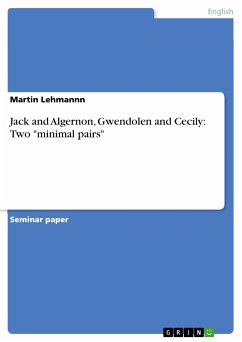Seminar paper from the year 2004 in the subject English Language and Literature Studies - Literature, grade: 1,7 (A-), Free University of Berlin (Institute for English Philology), course: Theatre of the 1890s: Wilde and Shaw, language: English, abstract: Lady Bracknell: […] How old are you? Jack: Twenty-nine. Lady Bracknell: A very good age to be married at. I have always been of opinion that a man who desires to get married should know either everything or nothing. Which do you know? Jack: (after some hesitation): I know nothing, Lady Bracknell. Lady Bracknell: I am pleased to hear it. I do not approve of anything that tampers with natural ignorance. Ignorance is like a delicate exotic fruit; touch it and the bloom is gone. The whole theory of modern education is radically unsound. Fortunately in England, at any rate, education produces no effect whatsoever. If it did, it would prove a serious danger to the upper classes, and probably lead to acts of violence in Grosvenor Sqare. What is your income? (IBE: 25-26) As this initial example points out, the function of the dialogue in Wilde’s “The Importance of Being Earnest” (“The Importance”) is radically different than in a classical drama. Lady Bracknell’s statements do not really serve to promote the plot. They are discursive, absurd and irrelevant to the context, but at the same time almost philosophical and extremely hilarious and entertaining. What makes “The Importance” a great play is not its sophisticated plot but the multitude of epigrams, paradoxes, non sequiturs and witty repartees which can be found throughout the text. Dialogue has a value in itself and is more important than plot. Therefore it is not surprising that the antagonisms between the characters are less central then in dramas which rely mainly on the plot. At first sight, the similarities between the main characters are quite obvious. Algernon and Jack are of the same sex and approximately the same age. They are both handsome bachelors who are in love with a young girl. Similarly, Gwendolen and Cecily also have a lot of things in common. They are young girls who desire to get married, both of them are very beautiful and have an obsession with the name of Ernest. The parallel structure is emphasized by the actions the characters take. At several times, one character simply repeats or puts into other words what someone else has just said. Even the sentence structure is mainly the same.

